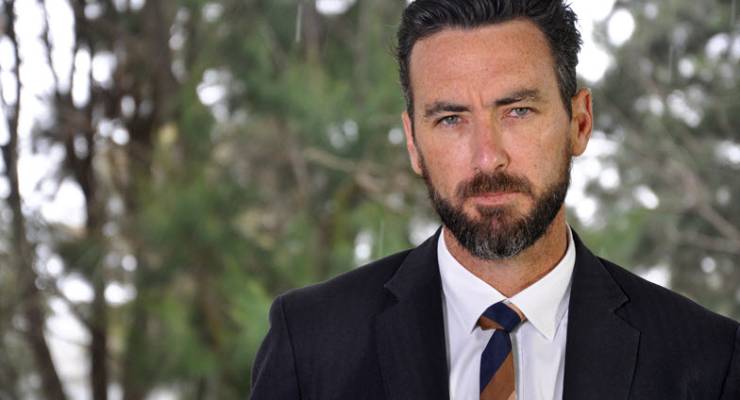
Outgoing Member for Perth Tim Hammond
Yesterday’s surprise retirement announcement by Labor frontbencher Tim Hammond brings two kinds of bad news for Bill Shorten: the loss of a cleanskin rising star from his parliamentary ranks, and the initiation of a byelection that’s all downside for him.
Hammond’s seat of Perth is one of three in Western Australia that remained with Labor at their low ebb in 2010 and 2013, so there will be few plaudits in retaining it from opposition at a byelection — particularly one held at a time when the state is recognised as a giant headache for the Turnbull government.
Poll trends suggest Labor’s landslide state election win last March also marked a watershed for federal voting intention in the state, with the swing to Labor settling thereafter at around 7% — easily enough to account for Attorney-General Christian Porter in Pearce, Aged Care Minister Ken Wyatt in Hasluck and bacbencher Steve Irons in Swan, while also putting pressure on Human Services Minister Michael Keenan in Stirling and rising conservative favourite Andrew Hastie in Canning.
However, the terrain of a Perth byelection is trickier for Labor than the broader polling picture suggests, and even if outright defeat is unlikely, the bar set by the prevailing high expectations will not be easy to clear.
Labor’s victories in Perth over the past decade have been achieved by a series of high-impact candidates, whose personal support concealed the effects of a series of unfavourable redistributions, in which inner-city growth caused the electorate to shed parts of its lower-income periphery.
Stephen Smith was succeeded in 2013 by Alannah MacTiernan, who had achieved almost cultish popularity as a state government minister from 2001 to 2008, and then served the western end of the electorate as mayor of Vincent.
Hammond’s profile wasn’t quite a match for MacTiernan’s, but he still came to the seat with a formidable reputation.
Having made his name as a barrister specialising in representing asbestos victims, Hammond suffered a respectable defeat in the neighbouring seat of Swan in 2010, built a power base in local party branches, and was elected to one of Labor’s two national vice-president positions in 2015.
Faced with the task of anointing a fourth candidate for the seat in five years, Labor’s powerbrokers appear to have settled on the party’s state secretary, Patrick Gorman.
Gorman also has a high reputation in his way, having administered the state party through an electoral renaissance during his three years as state secretary, and earlier served as an adviser to Kevin Rudd during both his prime ministerships and the time in between.
However, he is an unfamiliar figure outside political circles, and his party apparatchik role and mid-career tenure as a United Voice official expose him to charges of hackery that could never have stuck to Hammond.
As well as candidate factors, Labor pessimists and expectations managers also point to the effects of inner urban gentrification and the challenge of mobilising the party’s migrant base at a relatively low-profile byelection.
Furthermore, affluent voters in the inner suburbs form the one demographic group that has consistently responded well to Malcolm Turnbull, which was evident both in the pattern of swings nationally at the last federal election, and the Liberals’ respectable performance at the Bennelong byelection in December.
For all that, the Liberals are at least leaving open the possibility of not fielding a candidate, awkward though that may be for them after their mockery of Labor’s no-brainer forfeit of the byelection that replaced Colin Barnett in the blue-ribbon state seat of Cottesloe.
That would seem inadvisable because, given the right candidate – and Australian Medical Association president Michael Gannon has been rumoured as a possibility — it’s more than possible that the Liberals could add Perth to New England and Bennelong on the list of recent byelections where they outperformed expectations.
With even those polls now starting to narrow, that could be more than sufficient to put Bill Shorten under real pressure.








Taxpayers to fork out $2 million plus for a by-election when there’s an election due within 12 months anyway.
No wonder voters hate the people who go into politics. I hope Labor get smashed in the by-election just to send a message to the Party they should invest more care in psychological testing of the Muppets they preselect.
No mention of the federal Liberal party’s performance of late? Of course they won’t field a candidate, lest the floodgates open up swallowing up conservative politicians and commentators alike.
It’s most unfortunate for Hammond couldn’t have hung in.
The family pressures were obviously more than he and his wife could cope with.
Good luck to them and their kids.
Losing young, clever, articulate true believers like him is a loss for not just Labor but the nation; public life being what it is today.
Shorten and the rest need to get on their bikes and peddle like mad; there’s a lot at stake.
Didn’t this man do any research into the job he was applying for? We need politicians who are capable of future planning for the nation.
Is the desire to serve another one of these meaningless phrases like that bothersome S44 verbiage?
What did he imagine the venerable position of Member of the House of Representatives for the People (anyone recall them?) of the electorate of Perth in the Parliament of the Commonwealth of Australia would entail?
Not so much where does the Machine find these sock puppets but WHY?
A shortage of living, breathing, normal people who eschew the loathsome practices required to ascend the greasy ladder of factional warfare?
Quel suprise
New England and Bennelong belonged to the Coalition, Perth belongs toLabor. Poor comparison! Labor will more than hold.
Hear hear!